By Claire Bacon, ACN, CNC
Osteoporosis may be the #1 fear women have about aging. We’ve all seen those little, old ladies, hunched over with a hump in her back. They seem so frail and brittle, you almost don’t want to hug for fear of breaking them. No one wants this to happen to them. No one wants to be at risk for breaking a hip, either! Maintaining healthy bones becomes more and more of a top priority as we age.
Osteoporosis is a very common condition. Surprisingly, it affects 30% of women over age 50. Menopausal women lacking estrogen are at highest risk. It’s scary because a minor fall or even prolonged coughing can cause a fracture. The most common fractures occur in the hip, wrist or spine. Although lower estrogen levels are a normal and expected part of aging, we need to maintain a certain amount of Estriol, Estradiol, and Estrone during menopause to support proper bone growth and repair.
Osteoporosis causes bones to become weak and brittle, but it doesn’t happen overnight. Bone is living tissue that is constantly being broken down and replaced, all through our lives. Specialized cells called osteoclasts break down bone to remove old or damaged cells. Osteoblasts deposit calcium and other minerals into bone, remaking it. The process of replacing old bone with new bone is known as remodeling. What’s happening in osteoporosis, is that the creation of new bone doesn’t keep up with the loss of old bone.

Why is Osteoporosis so Common?
In a nutshell, it’s because we’re not consuming the nutrients or doing the activities that would keep our bones strong and healthy well into old age. Part of the problem is because of the misconception that dairy milk is good for us. This might surprise you, but drinking milk is not an effective way to protect bones.
Interestingly, hip fracture rates are highest in Western countries with the highest milk consumption. There was a study of over 61,000 Swedish women and 45,000 men – some of whom drank 3 glasses of milk a day or more. The study showed the participants with highest milk consumption increased risk of hip fracture 60%. (But one glass or less did not). Fermented dairy (like cheese, cottage cheese, yogurt, or kefir) also did not increase risk. The study concluded that a higher consumption of milk in women and men does not translate to lower risk of fracture. Instead, higher consumption may correlate with a higher rate of death. In other words, you could say there is a “sweet spot” of small portions of milk and fermented dairy being helpful or neutral, but excess amounts of dairy being potentially harmful.
There are two potential reasons for this:
- People often don’t produce enough lactase enzyme, and then can’t break down milk sugars. Our bodies are at a disadvantage because pasteurization destroys the beneficial enzymes and bacteria we need to digest the milk.
- The milk sugar D-galactose promotes activity of osteoclasts, which breakdown bone, causing oxidative stress and inflammation.
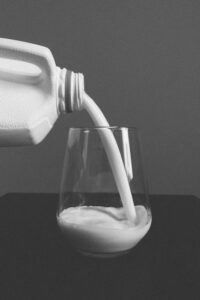
Contents of Healthy Bone:
Healthy bone is strong, yet flexible, and contains more than just calcium. A substance called hydroxyapatite, which is a mixture of calcium and phosphorus, makes up about 65 percent of your bone mass. Hydroxyapatite provides strength. To gain flexibility, the minerals bind with collagen, which is a strong form of connective tissue. Thirty-five percent of your bone mass consists of collagen, adding flexibility that helps bones absorb impact without breaking. Other minerals within bone include magnesium, zinc, boron, vitamin A and vitamin D.
From a physiological standpoint, the key minerals involved in bone remodeling (aside from calcium) are:
- Boron – helps maintain bone strength and keeps inflammation low.
- Copper – works along with enzymes such as lysyl oxidase to incorporate collagen and elastin into the organic component of bone.
- Iron – is a co-factor for collagen-synthesis enzymes. Be sure not to supplement iron and calcium at the same time, as they impair each other’s absorption.
- Magnesium – enables calcium absorption and promotes a higher bone mineral density.
- Phosphorus – combines with calcium to form a mineral crystal that gives strength and structure to our bones and teeth.
- Potassium – neutralizes our naturally occurring bone-depleting metabolic acids.
- Zinc – prevents the breakdown of bone and helps form new bone, as it’s a foundational building block. And reduces the systemic inflammation that can damage bone.
- Vitamin C – its role in collagen production makes it essential to the repair and maintenance of your bones and teeth. Remember – you want WHOLE COMPLEX vitamin C – not just the synthetic ascorbic acid!
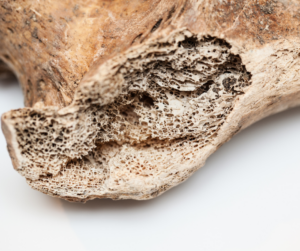
Top Strategies for Healthy Bone:
#1 Nutrient-dense Diet
You might be surprised to know: dairy milk is not as bioavailable as calcium from plant products. Sources of plant calcium, like calcium lactate, may be twice as absorbable. You want to eat a healthy plant-based diet with enough key nutrients, like:
- Calcium – oranges, spinach, kale, cauliflower, broccoli, Brussels sprouts
- Vitamin D – cod liver oil, salmon, bok choy
- Magnesium – dark leafy greens like kale, Swiss chard, Collards, or Mustard greens
- Vitamin C – fruit, especially berries, oranges, kiwis, to help mobilize calcium into your bones
- Celtic sea salt – with lots of other trace minerals that are also involved in bone growth & repair.
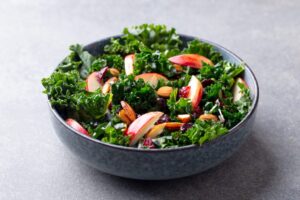
#2 Weight-bearing Exercise
You have probably heard that weight-bearing or resistance exercise can help prevent bone loss or strengthen already weak bones. It’s really important to incorporate these activities into your active lifestyle:
- Carrying weights when you go walking
- Swimming with hand paddles
- Lifting weights in the gym
- Resistance bands on the door handle at home.
- Balance and flexibility exercise – like holding poses in yoga or Tai Chi.
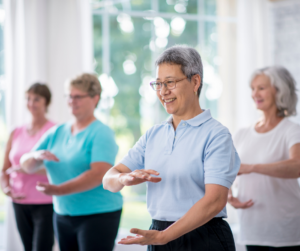
#3 Digestion
Did you know, older people don’t produce as much hydrochloric acid as when we were young. This causes incomplete protein breakdown – where you’re just not fully absorbing the good proteins you’re eating. You’ll want to support your digestion with apple cider vinegar and/or hydrochloric acid, to fully break down your proteins. One of our favorite digestive support products is Biotics Hydro-Zyme. It supplies the hydrochloric acid you need to digest your meat. However, if you have any history or suspicion you might have a stomach ulcer, it’s better to start with HCl-Ease. It’s a blend of herbs that soothe and restore proper stomach function.
And of course, you can take supplements to cover what you can’t get in your diet! Our favorites…
Supportive Supplements for Healthy Bones
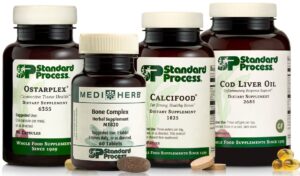
- Bone Complex is an herbal blend of Epimedium, Kudzu, Red Clover and Black Cohosh. These herbs work synergistically to promote natural estrogen production, and cellular turnover within the bone.
- Ostarplex is like a multivitamin for the bones, with “everything but the kitchen sink.” It combines key ingredients from several individual products:
- Calcifood chewable wafers are a convenient and nutritious snack for anyone concerned about maintaining or building healthy bones. It contains whole desiccated veal bone, so it includes every vitamin and mineral that naturally exists within bone. Excellent for kids’ normal growth and development, including healing fractures, and essential for anyone concerned about aging and bone density.
- Cod Liver Oil is our best essential fatty acid for year-round support. It supports epithelial tissue, bone and tooth health, the musculoskeletal system (bones), and is a great source of vitamins A and D.
Did you know, every vitamin that has ever been discovered exists naturally within Senaplex? Senaplex (for Seniors) is a mix of Catalyn and fiber. This product is full of whole-food complexes, not synthetics. It’s the naturally occurring cofactors that make the magic! It’s really great for our elderly grandparents who may not get enough variety in their nutrition or enough fiber.
Final Thoughts
Whether you choose to take a bone-density medication or not, literally everyone can benefit from the strategies we’ve outlined above. Solid nutrition, combined with weight-bearing exercise and appropriate supplements are a winning combination to keep your bones strong and healthy!


